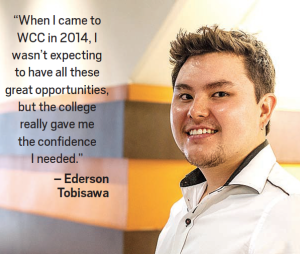
When Washtenaw Community College international student Ederson Tobisawa left his hometown of Mogi das Cruzes, a metropolitan region of the state Sao Paulo in Brazil four years ago, he considered moving to Russia to jumpstart his life as a medical student.
But he noticed that the good, affordable Russian program also required an advanced English course as part of its curriculum. He thought, “What better way to learn English than immersing myself in a culture where English is the official language?”
Suddenly, there was a major detour en route to his dream of becoming a doctor. Tobisawa traveled more than 5,000 miles to the U.S., where he would eventually pick up the language. While taking English courses at the Michigan Language Center in Ann Arbor, Tobisawa realized he wanted to continue his college studies in the U.S., but first, he had to return home to help his father with his trucking business.
While in Brazil, the then 23-year-old received some sage wisdom from his aunt back in Chicago where she resides. Her advice led him to discover Washtenaw Community College, where he would finally start to pursue his dreams of going to medical school, something he never deemed possible before stepping foot on WCC’s campus.
“There aren’t any community colleges in Brazil, so you only have the option of going to a university, but attending a four-year college right away was too expensive,” he said. “At first, I didn’t think my dream of becoming a cardiovascular surgeon was possible due to the costs. When I came to WCC in 2014, I wasn’t expecting to have all these great opportunities, but the college really gave me the confidence I needed.”
Fast forward to 2016 and Tobisawa now plans to transfer to the University of Michigan this fall.
Last summer, Tobisawa was part of the carefully selected group of students who participated in U-M’s Undergraduate Research Opportunity Program (UROP), which is designed for community college students with the desire to transfer to U-M, Ann Arbor. Students learn firsthand what it’s like to be an academic researcher by completing individual research projects, while also exploring academic careers and postgraduate careers, according to the university’s website.
“It was an eye-opening experience,” Tobisawa said. “During those 10 weeks, I learned how to work as a team, worked with directly graduate students, and I’ve managed to keep in touch with the Principal Investigator of the lab where I worked and other UROP staff even after the program ended.
“U-M can be very intimidating, but UROP made me more confident as student.”
Although Tobisawa always aspired to be a doctor, his life purpose and passion for the medical field became clearer during a very difficult time for his family.
“My dad suffered a heart attack in 2007,” he said. “Thankfully, he’s fine now, but I just want to be able to help others the same way those doctors helped my dad.”
That passion is what keeps Tobisawa pushing forward despite all the challenges that come along with being a student, let alone a soon-to-be medical student. Additionally, his family’s support has and continues to play an integral role in his success.
Several months from now, Tobisawa will likely be plugging away at his first semester at Michigan, but he said he is forever grateful to WCC for providing a solid foundation.
“When I look back and think about how much I’ve grown, I have WCC to thank for that. I wish I could stay here for my pre-med,” he added with a smile. “WCC has such a friendly environment, which is especially important when you’re so far away from home.”
By Princess Gabbara
Writer, Public Relations
